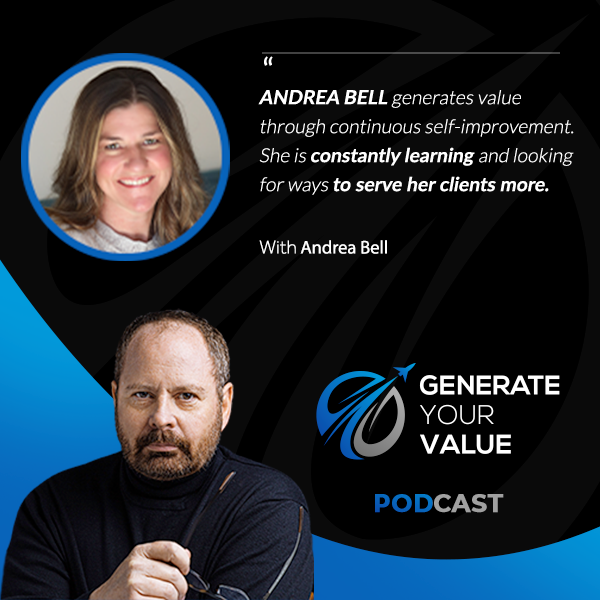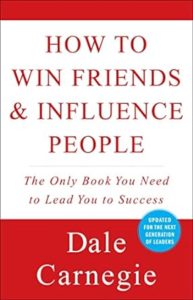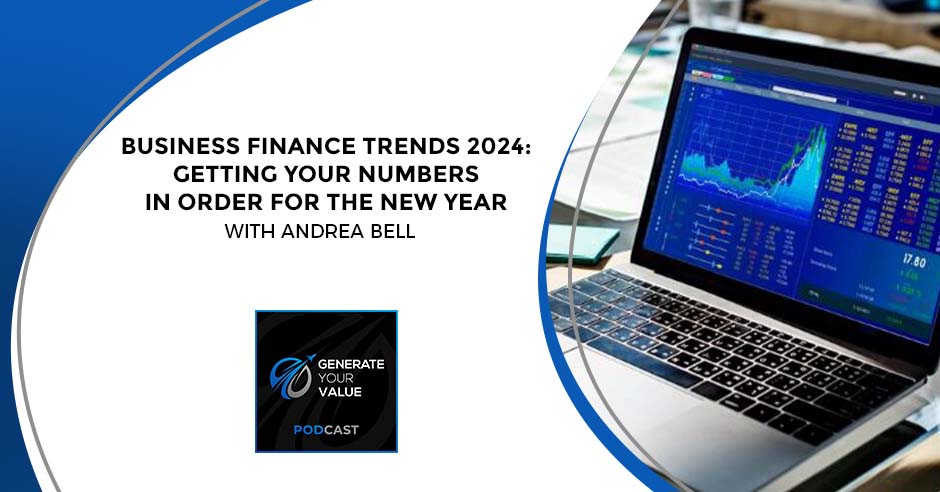From a financial and tax perspective, what should business owners be paying attention to in 2024? Andrea Bell of ProfitabilityCo joins us on the podcast today to talk about the most notable business financial trends for the new year and what business owners need to do to get their numbers straight and set themselves up for success. In this conversation, Andrea discusses crucial financial and tax considerations for business owners in 2024, including the new BOI reporting requirement at the federal level. Concerns about its invasiveness and potential impact on small businesses are raised. Additionally, emphasis is placed on effective expense management, proper tax planning, technology investments, cybersecurity, ESG considerations, remote work policies, and customer experience. Andrea also advocates for a strategic approach to pricing, encouraging business owners to consider profitability and value delivery rather than solely competing on price. The conversation underscores the importance of adaptability, innovation, and succession planning in the ever-evolving business landscape. Tune in and see how it can help you!
—
Listen to the podcast here
Business Finance Trends 2024: Getting Your Numbers In Order For The New Year With Andrea Bell
It’s the beginning of 2024. I thought a great way to help you as an executive or business owner in terms of conversations is to start talking about the year. What is 2024 going to look like for you? What kinds of things should we be paying attention to, given the situation with politics, economics, business, or taxes? From that perspective, these are things that we should be paying attention to as we’re relating our good strategic plans or business plans for our upcoming year.
I’ve brought in a guest who specializes in the financial side to help us with that conversation of what things we should be writing up on our whiteboard and what we should be paying attention to. Her name is Andrea Bell. She comes to us from the great state of Utah out there on the West Coast, trying to think of the Salt Lake sports teams.
We have a soccer team.
You have a basketball team.
It’s the Utah Jazz. That would be our biggest one.

There’s more college stuff in Salt Lake between BYU and so forth as opposed to pro sports. Let me read Andrea’s bio, and she’s going to talk a little bit about herself. We can get to know her even more beyond what the bio says. Andrea has many years of experience in accounting. She helped hundreds of business owners save millions of dollars in taxes, which is her specialty.
She’s the CEO of Profitability, a full-service accounting firm that specializes in the full picture of accounting. She loves helping businesses scale and grow, which we’re going to get into to be profitable money-making machines. She’s passionate about making sure her business is in alignment with the mom she wants to be and loves helping other women learn to do the same.
She’s the Founder of Thrive, a women’s business community that supports women entrepreneurs in taking their businesses to the next level. She provides courses and events to help inspire and empower women to create the life and business that they want without sacrificing their health, finances, or relationships so they can find the freedom and purpose they desire, finding that balance.
She’s a mom of three, a foodie, a DIY junkie, and a lover of all things self-improvement. She loves traveling, being outdoors, and being with her family. Andrea, welcome to the show. Thank you for taking your valuable resource called time to come to spend it with me and our audience. As always, I’m a big believer in storytelling and the power of storytelling in people’s lives as well as in leadership. We always take the first 5 or 10 minutes to let our guests tell their story wherever they want to start and help our audience get to know you a little bit better.
I’m like, “That leaves it broad. Where do I go with that?”
What do you want people to know about yourself?
Where it all started was when my parents were encouraging. They encouraged us to chase after all the dreams we could ever want. I was in love with horses. I wanted horses so bad. We had looked at a horse, and somebody else had bought it. I was super bummed out when I was young. My mom and dad sat me down distinctly, looking me straight in the eye and being like, “We know that you can be, do, and have anything you want. Anything you’re willing to set your mind to and work hard at, you can have it. We will do everything in our power to help you do that.” I took that literally. I did everything that I could think of.
I loved horses, school, and lots of different things. That gave me the motivation, but it gave me the courage to try lots of things, knowing that they had my back. They were like, “We might not be able to give it to you in the most expensive way. We’re not going to buy you a brand new horse trailer, the most expensive horse and private riding lessons like some of the kids had, but we will do everything in our power to support that.” Horses are an expensive hobby.
I have a lot of horse people in my life here in the Northern suburbs of Atlanta. I know all about it.
I appreciate my parents letting me pursue that dream. Doing that is a huge part of who I am, but it also encouraged me to work hard to go after things that I wanted. I always wanted a college education. I always knew deep down early on that I’d be a business owner. I didn’t take your common English class. I wasn’t reading To Kill a Mockingbird. I was reading How to Win Friends and Influence People, or The One Minute Manager. I was obsessed from the second I got into those classes. I always knew I would do something in business. I didn’t know what it was.
Knowing that my parents believed I could do anything I wanted, I was like, “I want to be a mom, but I want to be a business owner too.” It guided and directed the career that I chose, knowing that I wanted something that could be both. Accounting was the perfect fit. I loved math, numbers, and business. In accounting, I knew I could do it in the way that I wanted. I could work part-time, full-time, or only during the tax season. I knew I could find a way to possibly work from home.
My career has taken lots of different shapes and sizes over the years. When the kids were young, I didn’t work a whole lot. If I needed to, I worked a ton during the tax season. That blessed our family for the rest of the year. I didn’t have to go to work from 9:00 to 5:00 to be able to get that better paycheck. As the kids got older and went back to school, I was like, “I want to do my own thing.”
I always had a side gig in all those years, doing friends’ and families’ books and taxes. I’ve always been obsessed with businesses, their story, and how I can help them pursue their American dream. I love it. I love that you can virtually make money doing anything. I’m constantly coming home and telling my kids stories of business owners that I met, what they’re doing, how much money they’re making, and doing these crazy things that they’re passionate about. It’s exciting and motivating.
Most people don’t love the numbers side of it, but I geek out about it. I love numbers. I watched businesses fail over the years because they didn’t pay attention to their numbers. Even though you were excited and motivated and you’ve got this great idea, if you are not paying attention to your finances and those numbers, you’ll run yourself out of business. You’ll run yourself ragged trying to do it and kill yourself in the pursuit of that dream.
Even if you have a great idea, if you're not paying attention to your numbers, you'll ultimately run yourself out of business. Share on XIt’s a great dream. You can implement processes and procedures that help you keep track of the numbers or bring on people who can help you do the numbers because you hate it, which most of my clients do. They’re like, “I don’t know. I don’t care.” Their eyes glaze over. They don’t want to deal with it. That’s because they don’t have the bandwidth to do all of it. It is giving ourselves also grace to say, “I don’t have to do it all. It doesn’t make me a failure as a business person. It gives me the grace to focus on the things that I’m good at. Let’s hire, outsource, or do something with the pieces that you don’t love, that you need, and you still need in your business.”
My business has gone from only taxes and realizing, “I’m missing the boat as far as how to help these people be successful.” They can’t be successful if they don’t pay attention to their numbers through the years. It morphed into taking more of a bookkeeping perspective and making sure their finances and their financials were in order all year long. They could make better business decisions and educated business decisions based on real-time numbers. That allowed them to run their business in a more effective manner. Not after the case, like, “I owe all these taxes, and I have no money to pay them,” but being able to know what those were early on.
As I’m working with higher income people and higher tax brackets, we’re focusing on tax strategy, implementing early on all throughout the year, “What are some things that I can be doing that are going to save me in taxes and put more money back in my pocket?” We’re not giving the government tips, “I’d love to overpay you by $20,000 and $30,000. Are there things we can do throughout the year that put us in a better position that we’re keeping our money because we’re going to do better things with that money?” I want my clients to keep as much of their money as they can spend money in ways that benefit them but not overspend, especially for taxes.
Were either one of your parents entrepreneurs?
My dad always talked about it. That is why I always knew I would be a business owner because he was excited about it. I remember him talking about it our whole life. He would do pieces of it, but he never had the resources or the ability to go all in. He still had to provide for his family. It was sad to me to watch him never fulfill his dream because he’s a wonderful human being.
He is an amazing person. He would’ve been a fantastic business owner, but he chose to provide for us and do all those things for us. I always knew I wanted to be successful enough to be able to help them out because of how much they gave to us as kids. He planted the bug but never really did it 100%. He had a couple of side things that he tried.
I was curious whether your interest in business at such a young age was an innate thing for you or whether you had some influence in the home from somebody that steered you in that direction.
He planted the seed. Some of it was innate. I’m an innately weird person who wants to put myself through these things.
Did you have a favorite book when you were growing up before you left college? Do you have a favorite business book that has an influence on your life and your career?
It was How to Win Friends and Influence People. It’s life-changing. I bribed my children. I’m like, “I’ll give you $50 or $100. What do you want? Read it.”

My dad did the same thing in Milton Friedman’s book.
What was that one?
It was a famous book about capital markets and capitalism. A lot of people were saying it was like Jack Welchat at the time. Jack Welch was an it person. The time has passed. History is not riding things well for Jack Welch. It’s the same thing about Milton Friedman in his book. The book that had the biggest influence on me as a college student that I picked up from my dad was In Search of Excellence by Tom Peters.
It’s still a timely book, even many years later. He coined the term management by walking around. He is a big proponent of getting out of your office and desk, sitting down with your people, and understanding what’s going on inside your business and where you can improve the quality of service or quality of product to be seen and build a brand.
Branding wasn’t talked about a whole lot back then, but this big thing was about how you can be seen as an excellent company. What are some things you can do to do that in the marketplace? It made a big impact on me about trying to live a quality of life as well as being a participant in helping to build a quality company throughout my career.
I’m obsessed with anything about self-improvement. I don’t know if that’s what it’s called anymore. I love learning and growing. It’s awesome that your dad encouraged you to read that book. My kids love reading but not self-help books yet.
I felt the love of reading back in college. It wasn’t a big one in high school, but I learned a lesson. In my school system, you had to read outside of class in English classes. You read a certain number of books and schedule time with the teacher after classes to sit down and do an audible book report or have a discussion with the teacher about the book. The stuff they were feeding me, I had no interest in. It was a chore for me because you’re reading Greek mythology. I had no interest in that.
One summer vacation in high school, we were on vacation in South Carolina. My mom said, “Let’s go down the road and find a bookstore and see if we can find a book you think you might be interested in a piece of fiction.” I found a fictional book that took place during the Civil War and couldn’t put it down.
The big light bulb lesson that went on for me was that you have to find stuff that you’re passionate about and interested in. You soak it all up and read about it. Where my love of reading finally started was that you have to find stuff you’re interested in, not somebody forcing something down your throat you have no interest in whatsoever. It turns you off from reading, and you don’t learn or understand it. You have a love for it because it’s something you’re not passionate about. It’s a big life lesson for me.
That reminded me of a story. My dad always took us to the bookstore every quarter. He was an avid reader and learner. Everything that he needed to do, he’d go learn how to do it. He’d buy a book on the car or the engine. Whatever he needed to do, he’d learn it.
Until YouTube came around, now it’s all over on YouTube, “How do I fix this thing?” YouTube is a wealth of stuff.
I love that he had that passion for learning, and he ingrained that in his kids. He would let us go crazy. When I was obsessed with horses, I got horse training books and barrel racing books. When I was obsessed with business, I got those books. It was good.
I appreciate you sharing things about yourself with the audience. Let’s dive into the business. As you talked about before we started the interview, I’m going to open the floor to you and let you talk about, from a financial or tax perspective, what should executives or business owners be paying attention to in 2024. I have a few questions to ask you that I’ll pop in here or there. I thought we’d start off by letting the expert talk.
One of the biggest things that are affecting 2024 is this new BOI requirement that business owners who start in 2024 have to fulfill within 30 or 60 days. If your business was in existence prior to 2024, you have a whole year to fulfill that requirement. That new requirement requires you to report if you have anything over 25%, a majority interest in any business. It’s capped. If your business is $5 million or over or has over twenty employees, you are not required to have that done, but you are going to have to do that.

That’s not a tax-related thing. That’s a business owner thing. Most tax and accounting places will be able to do that for you for an additional service that they offer. You can do it on your own, but it’s new. Not a lot of people are experts in it. I’ve been doing a lot of research on it, but I am still waiting for more things to come out to help us know more. Is this going to be long-term? Is this something that they’re going to be like, “Never mind?” In essence, they’re trying to keep people from money laundering. I’m like, “I don’t know. Our small businesses are not the ones who are going to be doing that. I don’t understand the requirement.”
Is that being done at the state level or federal level?
It’s federal. It’s going to be required.
Are they going to be asking the states to collect that information and pass it on to them?
The business owners are going to be required to file this form. It’s going to be annually. Some people are like, “I don’t want them to know that about me.” It is invasive. We’ll see what happens. The people who had money had bigger lobbyists, and they got away with it. Anybody over $5 million isn’t required. Unfortunately, that’s when it hurts the people who can’t afford all these extra things, these small business owners and people running their businesses.
Businesses have to file and register with the state that they’re based in. The federal government could work with the states to collect that information because the states already have it through the registration process.
It’s on our tax return. With K-1 reports, your portion of the income from whatever business you’re invested in.
It depends on how you file your taxes.
There are some sneaky ways that people get around those things. That’s what they’re trying to avoid. Unfortunately, people are dishonest, but the majority of business owners aren’t. It’s unfortunate. I would watch for that. It is going to be a hefty penalty, like a per-day penalty if you don’t file on time.
I haven’t heard anything about this.
I reached out to even some other peers in my industry. They were like, “I had training on that, but I fell asleep. Let me do some more research.”
The acronym is BOI.
It’s the Business Owner Interest. I wasn’t planning on talking about it. It’s new.
You have to have over a 25% interest in a business to do it.
Anything you own 25% or more on, you have to report it.
Audience, I’m learning something right along with you here. I hadn’t heard a darn thing about this.
I’m curious to see if it sticks around. We’ll see. It’s up and running. They barely got the website up. I can get more details and share them with you so that you can share them with your readers.
Please do because we always put linkages to the guests and their businesses.
That would be good information for people because it’s not going to be something. Maybe your tax account’s not going to ask about it. Business owners need to know about it so they can ask about it and make sure they’re qualified. This is usually the time when most businesses start. It’s a new year. We’re excited. We’re like, “I’m going to do it. I’m going to pursue this business I’ve always been wanting.” If they are starting it early in the year, they’ve got to be on top of that within the next several months. Knowing that allows you to be prepared for that.
What else should we be paying attention to? That was a whopper at the beginning.
I can’t think of anything. Early in the year, I always encourage people to keep better books. Anytime I’m grabbing things, it delays the process. If your books are a mess, it delays the process of getting your taxes done. It delays the process of that anxiety that’s hanging over you, like, “How much taxes am I going to owe?” They haven’t kept good records.
Keep better books. If your books are a mess, it delays the process of getting your taxes done. Share on XBeing on top of your records, whether that’s yourself paying an outsource company, hiring a virtual assistant, or getting a company like ours that can do it for you, there are many different options depending on where you’re at in your business journey, but it is important. I would invest in the software. QuickBooks is the industry standard, but there are other ones that are cheaper, like Zero, and some other things that allow you to do it easily.
A lot of AI companies are coming out that are doing it. They’re okay for intro businesses. I don’t recommend that for a business that’s up and running. You need a person to look at and guide you in the direction that you need. Early on, that software works fine if you’re not willing to do it and don’t want to do it. That’s the biggest thing I’m pushing for my clients. If you’re an S-Corp, the biggest thing I see at tax time is if you are filing as an S-Corp, maybe you’re a single member LLC that your accountant told you you need to be an S-Corp. You’re required to pay yourself wages. If you’re not paying yourself wages, you’re making that S-Corp, in essence, invalid. If somebody or an auditor came back and audited you and got rid of that S-Corp status, it would be financially detrimental.
They’re good tax strategies. The government knows that, and they require you to do one simple thing. It is to pay wages. If you’re not doing that, get with a payroll company. Get an accountant and ask them, “What amount of wages do I need?” We don’t want you overpaying wages either, but you don’t want to not pay or underpay wages and put that S-Corp in jeopardy. That’s the biggest thing I’m getting with my clients who haven’t quite done it and got their payroll set up. I’m like, “Get it done,” so you’re in compliance.
I have something I want to compare notes with you that I’ve seen in my coaching. Let’s talk startups and business planning. A mistake I’ve seen with business owners looking to do a startup that gets them behind the eight ball is when they start budgeting or doing financial planning, looking at their business in the startup.
I’m going to use an analogy here. In the game of football, everybody likes to look at the offense. Who’s the quarterback? Who’s the running back? Who are the wide receivers? They’re the ones scoring the points. That’s where all the magic, attractiveness, and attention are. On the business side, that’s about the money coming in. That’s about the product, the service, the marketing, and the splash. That’s where they like to do all their focusing on.
In the game of football, the defense is your expense. The cost of having a football team is you have to throw defensive players out there because your opponent is going to have an opportunity to run their offense to try to score points against you. The cost of doing business to have a football team is you have to have the defensive side.
On the business side, that’s expenses. If you want to hang that shingle outside your door and say, “I’m in business,” you have a certain amount of fixed costs that you have to spend to be able to put that sign outside your front door and say, “I’m in business.” It’s not splashy. They get all wrapped around the revenues, marketing, product, and service. They’re not putting any thought into the expense side.
All of a sudden, they think they’re ready to launch and put that product and service out there. They start getting into the processes. They have clients coming in. The wheels are coming off the bus because they don’t have things in place that they should have and weren’t thought through. They got more expenses than they thought from their plan. They’re behind the eight ball when it comes to their business.
What I try to encourage them to do is to look at it from the standpoint of going back to the game of football, which is putting your defense out there on the field first. Don’t even think about the offense yet. What’s that foundation or fixed cost that you need to start the business and put that shingle that signs outside your door and says you’re in business? When the clients start coming in, you can execute your product and service and deliver a high-quality product service to the marketplace.

Build up from your expenses. If you have a profit target, here are your foundational expenses and variable expenses based on per customer. Here’s the variability. If you have a 10%, 15%, or 25%, pick a number of profitability you want that’s going to drive what revenues you need to be bringing on a monthly basis to hit those targets. That can lead to your marketing numbers and what marketing channel you need to bring in enough leads. What are your success rate and sales going to be? It’s going to drive those revenues in, cover all your expenses, and hit profitability.
It’s like a house. The foundation of the house is your expenses and your cost of being in business for whatever industry or business you’re looking for. Start building up from that until you get to how many leads you need to have. How many of those need to turn into sales? If you need X number of leads, TV, paid ads, or social media is your best marketing channel to get those leads and bring in the business so that you can hit your profitability targets. Does that ring major bells in your head because you’re seeing the same thing, or is it in other areas?
I’m shaking my head the whole time. I’m like, “That’s what they do.”
They’re enamored with people walking through the door with big dollar signs on their chests, and it’s the offense.
I had a great conversation with a client. You price based on competition. What are they charging? What can I get away with charging? I’m like, “No.” They’re like, “We try to be 10% under what our competition would be.” They started with the company, and they know how much people pay. They’re like, “I want to be a good deal. I do my pricing based on that.” I was talking to my client. I was like, “I’m concerned about your business.”
What’s your business model? Are you going to make it up in volume or what? How are you going to do this? Profit targets that your competition is doing.
How do you know what your competition’s expenses are? He has been doing a lot of stuff with politics and different stuff. That’s taken him away. He’s like, “I’m thinking.” He had to invest money into his business to keep it afloat. I’m like, “I’m concerned about that.” He’s like, “I knew this year would be bad because I was focusing on that.” I said, “You should be able to run your business in a way that you don’t have to be there. That’s all of our dreams. You don’t need to be there. That’s why we should be being the architects of our business, not the builder.”
You should be being the architect of your business, not the builder. Share on XHe’s like, “I was thinking I’ll end the year. Give it one more year and do it no more because I’m happy to put so much into it.” I was like, “What if we have some conversations and get your business done the right way? If these are your expenses and this is the person you have to hire to enable you to do this political stuff that you need to do and do the other things that you enjoy, what do our costs have to be?” He’s like, “Nobody would pay that.”
I was like, “Maybe you lose half of your clients, but you’re making a profit. Who cares? You’re working less, but now you’re making more than zero.” He’s like, “I had not thought of it that way. Do you know what I mean? That’s what most businesses are like. I priced it when my competitors looked. I have all these expenses, and I’m going to go out of business.”
What if we can get back into it? What if we think of it separately? We have to list those expenses, and we have to list those expenses inflated because we are not going to think of anything. If it’s 75, round to 100. If it’s 95, round it to 125. Give yourself some cushion because there is stuff you didn’t think of that it’s going to cost you to do. Put in that profit margin and offer it at that. If it doesn’t sell and you’re way too high priced and you don’t already have a client base as my client does, and you don’t already have a client base that potentially some of are going to stay with you because they love you and if you’re brand new, you have to find a way to decrease those expenses. You can’t decrease your price and keep all those same expenses.
It’s not necessarily a bad thing. If you’re higher than the competition, are you delivering more value? Is that going to be your business model? I’m going to be seen as the top of the line because I bring more value to my product or service than what the average Joe, that’s my competitor, is out there in charge of. Therefore, that’s how I want to position myself in the marketplace. It’s not necessarily a bad thing. It depends upon where you want to be in the marketplace. As the leader is seen as the highest value, and what you’re delivering is not necessarily a bad thing. You can get profitability by not having to sell as much volume, but you’ve got to do the proper marketing to educate the marketplace as to why you are the highest value.
I don’t think that it is a bad thing. What I was telling my client is, “You provide a great service. We love working with you. You’re more responsive. We’re not waiting forever and ever. The big box stores you fit us in. You take care of us. Why not charge more?” It’s a flooring company. I’m like, “I didn’t know what my floors cost when you quoted me. I didn’t even get a bid. If you would’ve priced it to where you made a decent profit, I don’t care. You’re in business to make money.” People who do not want you to make money and want something for free are not going to appreciate that service anyway.
Another thing I bang on the heads of my clients who are looking to do a startup or who’re only six months into their business is say, “I want to see your business plan. The first thing I’m looking for is a section that’s called assumptions.” They’re like, “What assumptions?” I’m like, “What assumptions do you have about your business or the marketplace that you’re building your business plan off of?”
The number one thing you need to do in your first year is validate or invalidate those assumptions. If you invalidate an assumption, you have to turn on a dime on your business plan with this information you’ve gotten that you didn’t have before, that your assumption was based on. You’ve got to do some tweaking to your business plan and adjust on the fly to take care of that new information you didn’t have before that you now have that invalidated your assumption.

That is the baseline for your books. What are you projecting? What are you assuming is going to happen? Comparing that to actuals. What’s happening week in, week out, monthly, quarterly, daily? In those early stages, you should be looking at your numbers every single day. What’s working and what’s not working in the three areas of your business? Your production, profits, and promotions. Are your promotions working? Is your marketing working? Do you have the right people in place? Do you have the right processes and procedures in place? It might not even be a profit issue. It could be one of these others, but you’ve got to focus on those three main areas. Do you know what numbers are driving those areas and how to improve them, if not?
The most valuable part about your bookkeeping or having your accounting in order is not so you can look at the past stuff. I love past stuff. It gives us good information about trends and how your business is working. What are the leading indicators? What are the driving things that you need to do? What’s the marketing that you have to do to get that? I hope it works out. How many people do you need to bring in to get that number?
When you go back into those things, it seems like it would be more overwhelming, and people avoid it because they’re like, “I’ll never be able to reach you. I’m going to work as hard as I can, put my head down, work as hard as I can, and try and get there.” Once you back into it, you’re like, “I only have to have ten clients at this price. I can do that.” If I talk to ten clients in one month, 30 days, every three days, I have to bring on a new client. It becomes much easier for your brain to have a plan and work towards it. The biggest thing that business owners should be doing is making a good plan. What are you trying to accomplish at the end of the year?
You’re monitoring it monthly. What are your key performance indicators? Some of those should be based on what your assumptions are. You’re paying attention every month. You can change on a dime if you need, and if you start seeing that data coming in on your KPIs based on your assumptions, and you go, “We blew it in this section. We have to adjust and bring expenses down so we can lower the price to get you profitable.”
The biggest thing I love when I’m working with business owners is trying to improve their profitability. Your profitability is how much money you have left over after you’ve made that income and paid all your expenses. The money at the bottom is your net profit. That’s what you get to take home. That’s what makes it worth it to run these businesses. If we’re at a zero, it’s not that exciting to get up every day.
You can pay all the bills, but you don’t have any profit to reinvest in the business to help it grow and scale or whatever your business goals are.
If you have investors, that’s how they get paid back. If your profit is not going to a good position, they’re not going to be happy with you. They’re not going to invest in your next project. The thing I love the most is it doesn’t take huge changes. It doesn’t have to be like, “I have to get rid of 50% of my expenses and increase my price.” These are little things, but multiply it. I like people to focus on at least three numbers. They want to improve by 10%. What if we increased our sales by 10%? What if we decreased our expenses by 10%? What if we increased our prices on current clients by 10%?
That exponentially grows your business and profit, instead of one thing that only does it 10%. I gave myself 10%. That wasn’t helpful. I feel like I have to make these big changes, but it can be small changes that are not overwhelming if you’re paying attention to those numbers. If you’re improving year after year like that, your profits are going to skyrocket.
It’s an easy thing to do. I’d love more business owners to do it, know and understand their numbers, and be able to make changes. You have to turn on a dime. When things are not working, you don’t keep doing them. You need to change what you’re doing and make a change immediately as soon as you have that information that this isn’t working. This month has been terrible. We need to change.
Every business has 1 or 2 major things that they’ve got to pay attention to. My business at Boeing was service-based and labor. When did I need another technical person to work on projects? I had to work closely with the sales team, looking at what potential projects could be coming in, looking at the labor piece of it, and deciding when I had enough business on the plate in the future that I could hire another person and keep them busy.
I love how you said that you needed to work with those other teams. If we think of the three Ps, profit, production, and promotion, if those three areas of your business, if we imagine them like three circles, and they’re not working together, the profitability of your business ends up being in the middle. The more we can bring those areas together and work together, the middle area is the overlapping area. That becomes your profitability.
If you sell a bunch of stuff and you can’t produce it because you don’t have enough people, that hurts your business. You’re not going to be profitable. If we’re all on the same page, we can guide our business to be profitable. In the early phases, we are everything. We wear all those hats. We’re going to be the sales team, the production team, and the accountant. As we grow bigger, who are people that we can put in those places that help grow and manage that? You’re keeping track of where everybody is on track. Are those numbers improving in all the areas? That helps our business grow exponentially.
I couldn’t go to my senior leaders. I had to justify hiring. I can’t get on a conference call and go, “I have a gut feeling our business is going to grow.” It doesn’t fly. I had to bring out the chart to show that our business was going to grow and be sustained. If I had a blip, I would go out and hire a contractor or something to help me with a blip. They had no problem with that.
If I could show that my business and my project load were going to be sustained over 1, 2, or 3 years, they would allow me to hire people to come in because I could justify looking at projected sales, projects, and what labor I needed. If I had that data, I could justify the reason why. I was more likely to get a sign-off on it unless there was some high-level, major hold on hiring that was outside of my control or my boss’s control from that perspective.
If there were no impediments at that level, you sold me on your projections and everything. We’ll hire somebody, but let’s work and make sure those projections come in. The profitability is not going to be an issue because you brought in the business that you were projecting. You have to go back to sales and go, “I’m hiring staff.” You can tell the customer we’re going to be able to deliver for them based on this, but you have to work extra hard to get that business in.
That’s huge. Most small businesses don’t run like that, and that’s what is to their detriment for the most part.
If somebody is looking for a financial services partner relative to accounting, bookkeeping, and taxes, what things should they be looking for when they’re out there having conversations with potential partners in that area? What questions should they be asking to make sure they’re going to get a quality service from a partner?
Our world is becoming digital. That’s how we see. If somebody did well, reviews are a great place to start. Find them online and see what they’ve been doing. Are they experts in their field? Do they understand your business? Sometimes, accountants can be industry-specific, and you want somebody like that. Is it tax preparation? Is that what you want? If they’ve got good reviews, it’s cool. If it’s more of a full-service thing, you need to have a conversation.
Make sure your personality is aligned, and they match. Most of my clients that come are like, “My CPA is bad. I can’t tell what he’s thinking. He’s dry. He’s helpful, but thank you for talking to me about my business and what my goals are. No one’s ever talked to me about that.” Talk to somebody who’s going to be in your corner, excited about your business, and driving it forward instead of mass producing some things.
That might be the right fit for you in certain situations. If you’re looking to grow, having those conversations and most places offer a free consultation to see if you guys fit. You’re not the right fit for our firm because we don’t do that, or you need a specialized person. They can help refer you to that person. Reaching out, looking for reviews, asking around, and making sure how long they’ve been in business or different things to look for, but looking for somebody who mostly has your best interest at heart and everybody’s business is in a different place of to what that might be.
It’s important for the business to think the way my brain operates. I’m always thinking about the strategy level and tactic level. If you’re looking for somebody to come in to do the numbers, give me all your data, and I’ll spit out all the reports, forms, and everything you need. To me, that’s the tactical area of your industry.
The strategy level is about taking those numbers, having conversations, and offering advice and guidance about what to do with the business overall at the strategic level with what these numbers are telling us. You’re deciding what you want out of your partner. In the beginning, from a cost perspective, you need the tactics part to check the box. You want to grow into that and keep the same partner.
You could have that conversation to say, “I need a tactics part, but why I want you to be a partner is I eventually want to get into the strategy piece. I don’t have the budget to do that. I don’t want to go jumping around finding 2, 3, or 4 partners down the road that can provide that. I’d rather come in with you guys. Let’s have a partnership together. As I grow the business and my budget increases, I’ll want you to get more involved in the strategy side of what all these numbers are telling me and helping me to make decisions. If that comes in, I will raise the expense with you all.”
That’s how we work. We start with the compliance and the bookkeeping piece. If that’s all you need and all you can afford, we’re happy to provide that piece for you. As you grow, the next step is we have to scale that business and increase those profits. Now we’re here. Those profits are okay. Can we improve those? Let’s increase those profits.
That next phase is the strategy of how I grow this business to either sell, be able to pass it to my kids, provide some passive income as I age out, or get interested in something else. What are those pieces I need in place to make that business accomplish my long-term goals? Those are more in-depth tax strategies. That is more in-depth, time, and involved and comes at a higher price.
They’re worth the investment because the savings you’re going to have, or the growth that you’re going to experience working with an expert, is going to be exponential compared to what you can figure out on your own. We do tend to do that grow with our businesses. As they grow, they need more services, help, and guidance. That was going to be when you’re looking for a person. You can get a lot of people to do that data entry. That’s not a hard skill. They can enter it.
I do training of bookkeepers. I teach them how to do bookkeeping. We bring them on and let them intern with our company. They can do the work, but do they understand what those numbers mean once it happens? Once you have those numbers and they understand it, do they understand the tax implications of those numbers and how that affects you? You’re getting more knowledge and expertise as you move up. If you’re on a lower budget, pick somebody who’s that data entry piece, and it’s still beneficial to your business. Scale is needed.
If people wanted to engage with you and your team in the future, what’s the best way they could reach out and connect with you, Andrea?
They can jump on our website. We are updating it and making changes. That is a little bit in construction, but it’s ProfitabilityCo.com. They can find us there in all of our contact information or email us at Info@ProfitabilityCo.com. We would love to help them in any way. We do offer a free 30-minute consultation. We’d love to hear about your business, how it’s doing, what your hangups are, what your things are going well, and how we could potentially be a piece to help you in that. We would love to talk about that.
Geographically speaking, how far out do you offer your services?
We’re virtual. We’re nationwide. It’s taxes across the US. We’ve worked with some companies in Canada. We’ve got other people that are outsourced in other areas. We have the potential to be global. We can help any state that you need help in. That’s what we love. I love Zoom and all those things. We can meet virtually in person and get to know each other and have a relationship, but still be able to get the job done wherever you are.
As I forewarned you in the green room, we have one question left for you. We ask every guest here the question, what do the words generate your value mean to you, Andrea?
We were talking about education, self-educating yourself, driving yourself to increase, and increasing your value. I’m always learning and growing. I’m not going to pretend that I know everything as far as tax or bookkeeping. There are many things that are growing and changing. I’m constantly learning and looking for ways to increase my value and knowledge. I can benefit my clients more.
Generating your value feels internal to me. We were talking about pricing. As you generate your value and know your worth, you’re going to have the confidence to ask for the prices that you’re worth instead of the prices that you think people will pay. That confidence allows people to be confident in you and what you’re offering. Constantly improve and push yourself to new heights every year.
Know your worth. Have the confidence to ask for the prices that you're worth instead of the prices that you think people will pay you. Share on XPart of what I love about the phrase is what it can mean about yourself as a human being and how I can generate value in this world and my relationships. It also translates well at the business level. Generate your value, which, in this case, refers to your business. How is it that you’re going to generate value in the lives and the eyes of your customers as well as your employees? Develop a culture that’s going to allow everybody to thrive, whether it be your customers or your employees.
The fine line as the CEO, business owner, or executive that you have to walk is to figure out how you can do the and not the or. It’s going to be the customers, or it’s going to be my employees. You’re doomed to failure if you use the word or. It’s about the and. Where can I find the win-win between the customers and the employees in the way that we do our business and develop our culture?
We didn’t get to it, but we were talking about how to scale. You can’t scale without people.
I was talking about my business from a labor perspective. That was the biggest thing that I always had to pay attention to. I was a service-based business. You might be a product-based business where people might be important, but the thing you have to pay attention to is I’ve got these big capital expenses. Take an airline for example. Airplanes are expensive. At what point do I start buying more airplanes? Where is that KPI that tells me not only I have to buy more airplanes but also that I have to buy them of this particular size? That gets into the business model, marketing, and revenue generation.
That’s a key thing that the executive leadership teams can look at before they give the procurement department an agreement to buy more airplanes. What’s happening with my marketing and demand that’s going to justify the huge capital expense of buying airplanes? That’s because that’s needed for the foundation of this business of transporting people and goods from point A to point B.
Every business has that one major thing. For me, it was people. For an airline, it’s airplanes. It makes no sense to go out and hire more people, pilots, and flight attendants if you don’t have an airplane to put them in. The airplane is leading or driving the people part later on. You have to pay attention to the thing that’s at the beginning of the process, but you have to take the people and the labor into account when you’re developing the equations and the algorithms and looking at when it’s trying to buy that next or add airplanes to the inventory.
I can’t thank you enough for taking that finite resource of your life called time to come to spend it with me and our audience and share your wisdom on the financial side. I learned something. I’m trying to figure out what I need to do in my business regardless of something that I had no idea even existed. They only give you 30 or 60 days with which to do this when you’re not educating people out there and splashing it out there on social media to allow business owners to understand that it’s this new requirement out there.
I have not put it online yet because I do not feel I’m the expert yet. It’s new. Once we get into tax season and start seeing these new businesses and working with them, we’ll get a better idea.
Tax season goes in April. If they got 30 or 60 days, you have to do this. By the time tax season, it’s over, and you’ve already screwed up because you didn’t do this.
It’s a hefty penalty. I didn’t read the article right before. It’s $500 a day. It’s something stupid.
They’d be better off for the first year being a lot more lenient on this as they bring this requirement in and say, “In year two, we’re going to push it up in 30 to 60 days because we’re going to allow the first year to get people used to the idea that this is a new requirement.”
That’s only if you start in 2024, but you have a full year if your business is already in existence.
There must be front loading the information when people are going to this state and county to do all their paperwork to get licensed.
If they’re doing it on their own through their state, they wouldn’t know that. If you’re going to a lawyer or an accountant, they’re going to help you do that correctly. It’s going to be those people who are doing DIY and new businesses. They’re going to miss it. It’s important to do that. I’ll get some information out for everyone.
For the audience, I hope you got a lot out of this. I got something out of it that I didn’t even think I was going to get with this conversation before it started. I can’t thank you enough for joining Andrea and I on this episode. Andrea, we call them golden nuggets on the show. I hope there are some golden nuggets out of our conversation that you’re going to take and integrate into your business or the way you lead your business or into your life, whatever it may be. That’s the reason why we’re here, why we do what we do to generate your value for the show.
With that being said, we’ll have another great guest here to bring you some more information and a new person to get to know here on the planet Earth. I hope you have a great day. Have a great week. Keep generating your value. Keep that growth mindset that Andrea talked about, read books, and soak in as much information as you can to maximize the value that you can generate in your own life as well as in the world. That’s why we’re here to help you do that with the show. Have a great day, have a great week, and we’ll see you next time. Take care.
Important Links
- Profitability
- To Kill a Mockingbird
- How to Win Friends and Influence People
- The One Minute Manager
- In Search of Excellence
- Info@ProfitabilityCo.com
About Andrea Bell

Andrea is a mom of 3, wife, foodie, DIY Junkie and lover of all things self improvement. She loves traveling, being outdoors and being with her family. Andrea has over 20 years experience in accounting and has helped hundreds of business owners save millions of dollars in taxes.
Andrea is the CEO of Profitability, a full service accounting firm that specializes in the full picture of accounting. She loves helping businesses scale and grow to be profitable money making machines. Andrea is passionate about making sure her business is in alignment with the kind of mom she wants to be and loves helping other women learn to do the same.
She is the founder of Thrive, a women’s business community that supports women entrepreneurs to take their businesses to the next level. She provides courses and events that help inspire and empower women to create the kind of life and business that they want without sacrificing their health, their finances, or their relationships so they can find the freedom and purpose they desire.







